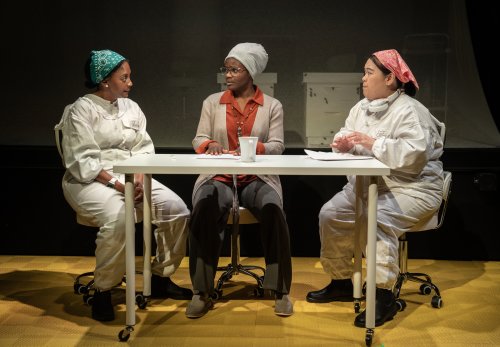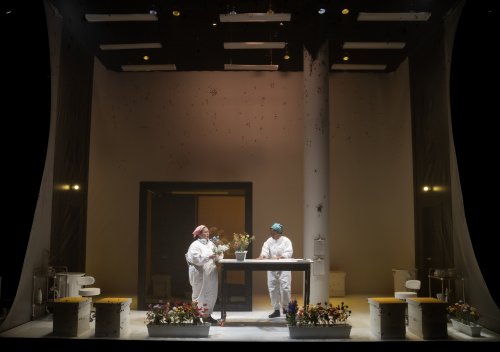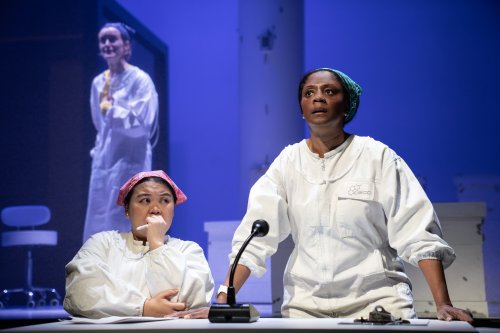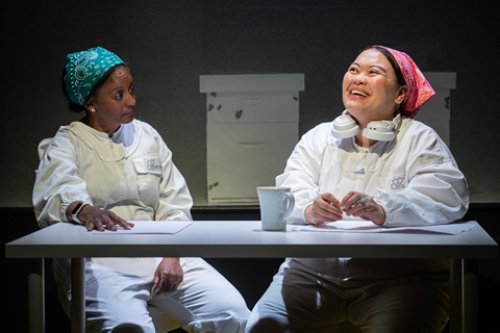The Apiary
A cautionary tale about ecology, faith, science and honey bees set 22 years in the future.

April Matthis, Nimene Wureh and Carmen M. Herlihy in a scene from Kate Douglas’ “The Apiary” at The Second Stage’s Tony Kiser Theater (Photo credit: Joan Marcus)
[avatar user=”Victor Gluck” size=”96″ align=”left”] Victor Gluck, Editor-in-Chief[/avatar]
Kate Douglas’ The Apiary, part of Second Stage’s Next Stage Festival, is a play about ecology and faith. Set 22 years into the future, most of the honeybees in the world have been dying off and as a result products like honey, avocados and almonds no longer exist. However, two lab assistants have come up with a plan to save them, but it will take human volunteers for the experiment. It is a cautionary tale mixing science and science fiction. The initial premise is not so hard to believe as there have already been shortages due to climate change. The outcome needs a bit of suspension of disbelief.
Unfortunately, at 70 minutes the play seems skimpy. Structured in a great many short scenes, only one thing happens in each, so that there is a sameness to it all. Basically a two character play with two lab assistants Zora (April Matthis) and Pilar (Carmen M. Herlihy) attempting to come up with new solutions to the problem and spoken in the level-headed tone of scientific investigation, the play does not offer climaxes or high points but moves on the same plane. The four actors playing seven characters remain on the same level without developing or changing. Kate Whoriskey’s direction appears to have eschewed raising tension to make the play more interesting or more dramatic, something it sorely needs.

Carmen M. Herlihy and April Matthis in a scene from Kate Douglas’ “The Apiary” at The Second Stage’s Tony Kiser Theater (Photo credit: Joan Marcus)
The story (what there is of it) begins when Zora, a Ph.D. from the prestigious and well-funded Townsend Labs transfers to the Synthetic Apiary, a less important lab that is working only on bees. She is assigned to a unit with Pilar, a dedicated but not as well educated technician who grew up around hives and bees. Both of them come up with several possible solutions but Gwen, their supervisor, is usually worried about the cost which Zora is willing to cover herself. Nimene Wureh plays a series of young women interviewed for various experiments at the lab. In a poetic effect, Stephanie Crousillat dances to choreography by Warren Adams periodically as a symbolic depiction of the bees in moments that are not very well connected to the rest of the play and seem both intrusive and extraneous.
Matthis is sympathetic as Zora though we never learn enough about her. She represents the through line in the plot which we stay with due to her. As the supervisor Gwen, Schillng is hysterical and short-tempered, a sort of parody of the harried bureaucrat. Herlihy is sweet as the assistant, though she seems rather too unsophisticated to have such an important scientific job. However, she may simply be a lowly technician. As four separate characters, Wureh is not different enough to give them each a personality of their own.

Taylor Schilling, Carmen M. Herlihy and April Matthis in a scene from Kate Douglas’ “The Apiary” at The Second Stage’s Tony Kiser Theater (Photo credit: Joan Marcus)
Walt Spangler’s single set for the science lab at the apiary with its two-story white netting and lab tables is realistic and believable. Unfortunately, it quickly grows tedious as it remains the same throughout the play. So too the costumes by Jennifer Moeller are generally white lab suits only differentiated by the women’s different colored head scarves. It is surprising that there are not more sound effects from the hives of bees in the design by Christopher Darbassie. Grace McClean’s original music accompanies Crousillat’s dances but fails to suggest the sound of bees.
While plays on science and the effects of climate change are very much needed at this time to wake up audiences concerned only with their own personal problems, Kate Douglas’ The Apiary is unlikely to wake most people up. Too low-key where it needs to be powerful and vigorous, the play ultimately has little impact. Except for Matthis’ sincere woman of integrity, the actors are too mild to make much impression. Kate Whoriskey’s direction is bland and tepid where it needs to be incisive and trenchant.

April Matthis and Carmen M. Herlihy in a scene from Kate Douglas’ “The Apiary” at The Second Stage’s Tony Kiser Theater (Photo credit: Joan Marcus)
The Apiary (extended through March 3, 2024)
The Second Stage
Tony Kiser Theater, 305 W. 43rd Street, in Manhattan
For tickets, call 212-541-4516 or visit http://www.2st.com
Running time: 75 minutes without an intermission






Leave a comment